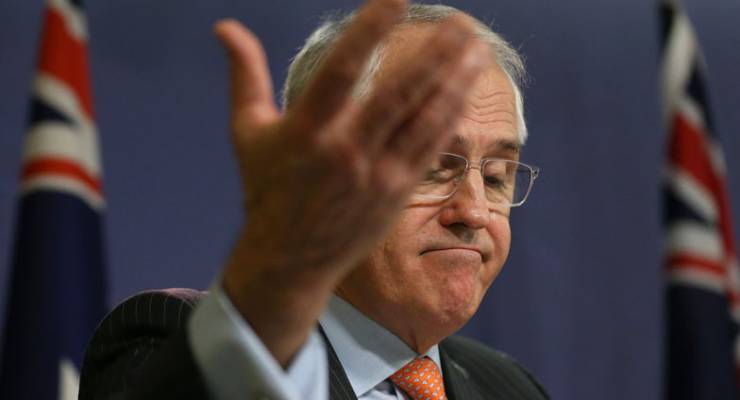
With the counting continuing at the deliciously slow pace set by the AEC, we are given the opportunity to consider what’s about to happen. And the answer is clear. We are a witness to history. The federal Parliament we have just selected is the one that offers the least chance of deriving a legitimate or effective government. We have surpassed the “three-cornered” parliaments of our first decade, when Labor, Protectionist and Free Traders swapped alliances, bringing each other down in the 1900s; surpassed the collapse of the late 1930s, when the UAP started to come apart; or the Country Party-Labor Party brouhaha of the 1950s.
Consider:
- Labor is pulling ahead of the Coalition in the overall two-party preferred vote — about 50.2% to 49.8% — yet it appears that the Coalition will have more seats, and even a one-seat majority. That gives Malcolm Turnbull first nod to try and form government, even though — by the raw understanding of the Australian public — Labor has “won” the election.
- Depending on the final number of senators the Greens take (six to nine), the ALP-Greens bloc (the ALP has 27) would approach the 38 votes needed to get legislation through, requiring only NXT to do so, or Lambie plus Hinch. The Coalition, on 30, by contrast, have a nearly impossible task, corralling four or five different groups and individuals into one, and trying to avoid dealing with Hanson’s One Nation.
- The closeness of the result, the contrary majority/seat majority settings, the rise of lower house independents, means that nothing resembling a mandate can be claimed in the lower house, even if the Coalition cracks the magic 76. There is no chance that a Senate crossbench, elected as “outsiders”, will be willing to conform to Senate conventions.
- Turnbull, as caretaker PM, would, it seems, only have to take regard of the lower house in advising the Governor-General as to whom he should call on, i.e. him. But if Labor and the Greens formed an alliance, then the Senate arrangement would give Turnbull reason (at least formally) to advise the G-G to call on Shorten first.
- Turnbull won’t do this, of course, but in trying to actually govern, he faces a nearly impossible task, and his team would be treated with great hostility by the non-NXT crossbenchers, eager to burnish their outsider credentials with a show of disdain and demand. Yet Turnbull must wait at least two years to hold an election with a half-Senate election — and this would only replace crossbenchers with Greens, or other crossbenchers. A House election only is less likely to deliver the Coalition a second-time-round majority, simply because Turnbull has so undermined his own authority with the long campaign that he has lost much of the “legitimacy” claim. Another double dissolution does not bear thinking about.
- Would Turnbull then challenge Labor to support the government’s key measures, in the interests of system-legitimacy, thus cutting the crossbenchers out altogether? That would put Labor on the spot, since to refuse such stability would look churlish — but the Libs would then pack their measures, with elements Labor would find almost impossible to swallow.
- The entry of an organised hard-right party into the Senate will put immense pressure on the Liberal party room. The conservatives will want to move rightward to take their policies, the moderates will resist (to some degree). It seems impossible that Turnbull could lead this party. It is not impossible (though unlikely) that Hanson’s group could attract Coalition defectors.
- It is not the country that is unstable, but the system. The country has voted in an orderly fashion. The particular constellation of the system has then created a result that hangs between single-party government (which it was designed to facilitate), or multi-party agreements (which it constructs as lacking legitimacy), without being able to affirm either. There seems little doubt that minor parties will grow — and thus every possibility that our lower-house preferential system will become a machine for hanging parliaments. From here on, it’ll be landslide or a hung mess. Even with the higher quota of half-Senate elections, the prospect of easy Coalition control remains slim.
- The situation we are in has little analogy with the great ruptures taking place in the UK, US, Europe. We may get those, but for the moment, it is our institutional structures generating outcomes that make those very structures unsteerable, i.e. ungovernable. If we want a way out of that, the major parties will have to ditch their insistence on single-party government.








Crikey is committed to hosting lively discussions. Help us keep the conversation useful, interesting and welcoming. We aim to publish comments quickly in the interest of promoting robust conversation, but we’re a small team and we deploy filters to protect against legal risk. Occasionally your comment may be held up while we review, but we’re working as fast as we can to keep the conversation rolling.
The Crikey comment section is members-only content. Please subscribe to leave a comment.
The Crikey comment section is members-only content. Please login to leave a comment.